EMAIL TRANSCRIPT - Indigesting The Faux Liberal Media: "see how you felt when you finished reading it, shitty eh?"
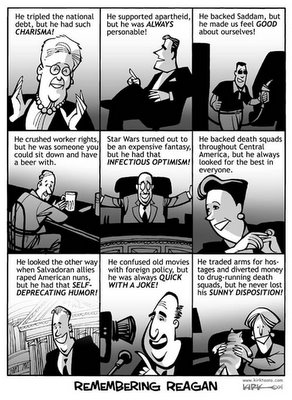
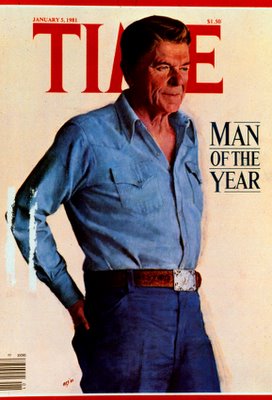


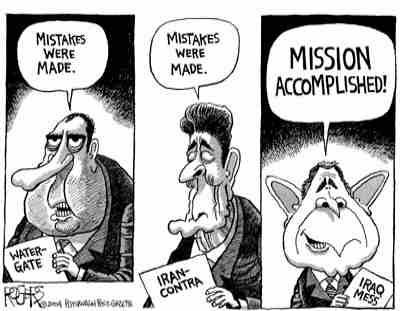
The margins of political debate are extremely narrow, and it's hard to convince people they don't know what's going on when they know so much awful half-knowledge.
This has always been the case to some degree, but with today's pace of information overload most news is simply sold as "what went wrong?" and "here's some human interest pablum".
As long as you watch a few tragedies and then get cheered up by celebrities, you're informed.
You're in the loop.
Context is not important, history is irrelevant, and heroes are virtually non-existent.
Why?
Heroes defend people from power, speak truth to power, and mobilize people against the threat of power.
They always have been.
Unfortunately, evil right-wing power ensured that President Reagan ripped up The Fairness Doctrine in the 1980's and wiped his ass with it, effectively ending rules guaranteeing equal TV-time for candidates of different political parties, and guaranteeing any candidate who wants coverage has to kiss up to the corporate media.
Reagan also allowed the consolidation of the media to an unprecedented degree, ensuring that the media, or the "Fourth Estate", that is supposed to protect us in case the Presidency, Congress and Supreme Court fails, is instead even more powerful than they are, and working even more powerfully to promote a corporate agenda in tandem with corrupt politician.
In 1980 over 50 companies owned the mainstream media.
Now it's 5.
5 corporations control 95% of nightly U.S. news programming.
2003 annual revenues:
Comcast: 18.3 Billion
Viacom: 26.6 Billion
Time Warner: 39.6 Billion
GE 134.2 Billion
Vivendi: 30.1 Billion
News Corp: 17.5 Billion
Bertelsmann: 19.8 Billion
In North America- Approximate number of:
Newspapers: 1800
Magazines: 1100
Radio Stations: 11,000
TV Stations: 2000
Book Publishers: 3000
Number of companies listed as owning a controlling interest in the above Media:
In 1984 – (50)
1987 – (26)
1996- (10)
2002- (6)
SOURCE - http://newswire.indymedia.org/en/2005/10/825642.shtml
If you disagree or rock the boat, you get no face-time.
Just ask black Congresswoman Maxine Waters, who in 1996 fought to publicize the proven news story of the CIA introducing crack to poor blacks in Los Angeles in the 1980's (when cocaine was previously unaffordable and thus almost unheard of), in order to fund Nicaraguan rebels against their democratically elected socialist government.
(10 mins) WATCH - http://gnn.tv/videos/30/Gary_Webb_In_his_own_words
Or ask her about leading a plane trip to Africa to catch up with Haitian President Jean-Bertrand Aristide after he was deposed in 2004 in a U.S.-backed coup.
Or ask black Congresswoman Cynthia McKinney, star of the new documentary "American Blackout" about the stolen 2000 and 2004 elections that won an award at the Sundance Film Festival, and who recently grilled Donald Rumsfeld on C-SPAN about 9/11, the Dyncorp domestic sex-trade, the Pentagon missing trillions of dollars...
(8 mins) WATCH - http://www.infowars.com/articles/us/mckinney_grills_rumsfeld.htm
Or watch Fahrenheit 9/11, and remember all the black Congresspeople protesting voter fraud in the 2000 election, and being shot-down one-by-one by should-be President Al Gore presiding over a hearing on the issue that was completely unreported by the media. Neither Gore nor a single Senator would challenge the media on this issue, and with good reason.
(2 hrs) WATCH - http://www.thedossier.ukonline.co.uk/video_iraqwar.htm
Gore was already being skewered by the "liberal media" who uniformly decided that "conservative" George Bush had won despite the result being decided by a "conservative" Supreme Court on a 5-4 "One-time-only and this has no value in setting a precedent because Sweet Jesus it is a total violation of the law!" decision, and that any efforts to fight the results were bad sportsmanship.
With the "conservative" calls to "accept" the results growing louder and louder and louder in unison in the "liberal media", that was that.
The reason Reagan is important is that he was the free-spending puppet-President who destroyed the checks and balances ensuring a reasonably diverse and healthy media, an institution coming off the heady investigative journalism highs of the 1970's, with the end of the Vietnam War and impeachment of President Nixon.
Reagan was the predecessor of the current free-spending puppet-president, George Bush, who's really been put in power by, as NY Times columnist Paul Krugman put it, "a plan started over 30 years ago by the malefactors of great wealth and the religious right". They are currently fulfilling ambitions initiated by the crushing 1964 defeat of Presidential nominee Barry Goldwater, who carried only 6 states and 36% of the vote running for a divided Republican Party.
They are divided no longer.
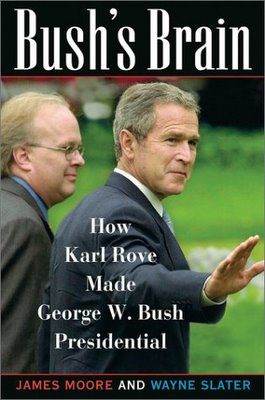
"If you tell a lie big enough and keep repeating it, people will eventually come to believe it."
"The lie can be maintained only for such time as the State can shield the people from the political, economic and/or military consequences of the lie. It thus becomes vitally important for the State to use all of its powers to repress dissent, for the truth is the mortal enemy of the lie, and thus by extension, the truth is the greatest enemy of the State."
"The most brilliant propagandist technique will yield no success unless one fundamental principle is borne in mind constantly - it must confine itself to a few points and repeat them over and over."
"Think of the press as a great keyboard on which the government can play."
"What you want in a media system is ostensible diversity that conceals an actual uniformity."
"What you want in a media system is ostensible diversity that conceals an actual uniformity."
"What you want in a media system is ostensible diversity that conceals an actual uniformity."
- Joseph Goebbels, Nazi Minister of Propaganda

You know, they say it's not how you start something, it's how you finish.
A friend who's sympathetic to my goals sent me the article below, and suggested that their preferred and traditionally "liberal" paper was coming around, and finally beginning to tell the truth about the Bush Administration.
The article's not bad, though it mostly recycles old news to create a new story about how hard it is to criticize the Bush Administration.
They also use a pessimistic "expert" from an obscure quarterly publication (Dissent Magazine) to avoid citing any daily alternative news sources who might be in direct competition on a daily basis with their daily newspaper.
So, for the casual reader not too familiar with politics, one who's already forgetten about the 15 million people worldwide who protested before the start of the War in Iraq in 2003; the 50 million Americans who voted for John Kerry in 2004; the millions of Americans giving George W. Bush a 36% approval rating in 2006; and the millions of ordinary people spending their time as activists and alternative news sources who are working tirelessly to make visible dissent possible against incredible odds and an electronic Berlin Wall of controlled corporate media...
...it sure ends with a whimper.
Oh well.
(sigh)
What're you gonna do?
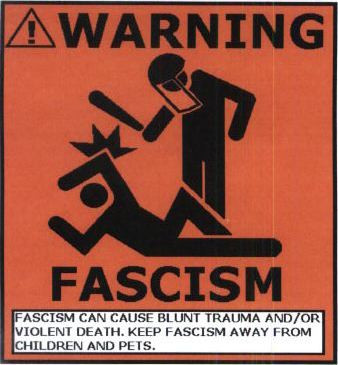
EMAIL TRANSCRIPT:
From [name witheld]
the toronto star is going back and forth no?
Still the enemy
http://www.thestar.com/NASApp/cs/ContentServer?pagename=thestar/Layout/Article_Type1&c=Article&pubid=968163964505&cid=1140216612759&call_page=TS_News&call_pageid=968332188492&call_pagepath=News/News
Sun Feb 19 14:46:22 EST 2006
---
Subject: Re: [The Star Article]
To:
it's not bad, though it's a bit of a red-herring.
you can tell by the
way the article ends, and like most "liberal"
articles it ends with a
dead-end feeling of powerlessness, like "it's
bad, but... oh well,
there's nothing significant being done and thus
nothing i can do."
see how you felt when you finished reading it,
shitty eh?
(...)
The Toronto Star
Still the enemy
Three years after the invasion of Iraq and more than five years since 9/11, people who speak out against George W. Bush and his administration are paying a steep personal price
Feb. 19, 2006. 01:53 PM
OLIVIA WARD
The news for President George W. Bush is daunting.
Poll ratings are skidding, scandals are on the upswing, the "i" word (impeachment) is fluttering on the horizon, and his tough-talking vicepresident can't shoot straight.
But are his opponents declaring victory? Are they carried through the streets by admiring crowds, proclaimed as prophets on the hottest news networks, vindicated in standing-room-only town hall meetings?
Not.
On the contrary, those who have famously trumpeted their critical views of Bush are still in the political doghouse, particularly if they opposed his administration on its war in Iraq or the "war on terrorism." Even as the tide of public opinion turns, critics of American policy since 9/11 continue to pay a damaging price for their opinions.
"People are still afraid to speak out, and when they do, there are few places they can go to be heard," says Michael Ratner, an international human rights lawyer and president of the Center for Constitutional Rights in New York. "Those who do speak out are marginalized, attacked and discredited."
When Bush first ran for office, Ratner points out, his motto was "politics is war conducted by other means," a slogan taken from a campaign pamphlet by neo-conservative activist David Horowitz that paraphrased 19th-century Prussian military strategist Karl von Clausewitz.
"In political warfare you do not fight just to prevail in an argument but to destroy the enemy's fighting ability," Horowitz declared. "In political wars, the aggressor usually prevails."
For those who missed the point, Horowitz added a quote from Vladimir Lenin: "The goal is not to refute your opponent's argument but to wipe him from the face of the earth."
Spurred on by Republican éminence grise Karl Rove, Bush's campaign team galloped off to victory in two elections. Though the numbers didn't cover them in glory, they left their enemies bleeding on the field.
And, shortly after Bush's first election victory, the 9/11 attacks set the tone of his presidency.
The trauma of the massive assault, and the belief that the country was living under an Islamic sword of Damocles, created an atmosphere of anxiety and imminent danger, resulting in a more passive attitude to authority. The subsequent invasion of Iraq also intensified the political battle, splitting parties as well as relations between the United States and other countries.
In a world assailed by fear and uncertainty, and overwhelmed by messages of unity and patriotism, dissidents were moving targets.
In America, bereaved military mother Cindy Sheehan was harassed and arrested for her high-profile protests. War-hero presidential candidate John Kerry was accused of cowardice for opposing the invasion, along with decorated veteran and Democrat congressman John Murtha. Triple amputee vet Max Cleland lost his Senate seat after his opponent ran a campaign linking him with Osama bin Laden. Oscar-winning actress Susan Sarandon was booed off the stage for speaking out against the Iraq war.
Internationally, United Nations Secretary-General Kofi Annan was declared "irrelevant" and attacked for alleged corruption after he rejected a unilateral invasion of Iraq. Nobel Prize-winning International Energy Agency chief Mohammed elBaradei was accused of incompetence and his new term of office threatened.
In Britain, which supported the war, defence ministry official David Kelly committed suicide after disputing Prime Minister Tony Blair's claim that Iraq could fire deadly weapons on 45 minutes notice.
Diplomatic ties also frayed as French President Jacques Chirac was treated as an enemy by the White House, and Jean Chrétien was regarded with contempt in Bush circles for refusing to support the Iraq war.
Most of those who have paid the highest price for dissent have been Americans.
One was Joseph Wilson, a former American diplomat who blew the whistle on a Bush administration claim that Iraq had tried to purchase uranium ore from Niger, bolstering its contention that Saddam Hussein was producing nuclear weapons.
Wilson, who went on a fact-finding trip to Niger in 2002, accused the administration of "exaggerating the Iraqi threat" in order to launch the war in a New York Times essay in July 2003.
A week later his wife, Valerie Plame, was named as a CIA agent by right-wing columnist Robert Novak, an event that sparked a furor in Washington and appeared to be the opening shot in a campaign against Wilson. A probe of the Plame leak has continued since December 2003 and resulted in the indictment last October of Vice-President Dick Cheney's chief of staff, Lewis "Scooter" Libby.
Wilson, who was prepared for an attack by the Bush administration, was taken aback at the potentially dangerous intelligence leak aimed at his wife.
"I have in my closet memorabilia notes from the first President (George) Bush lauding my courage and leadership as a diplomat (in Baghdad and Africa)," he said in a phone interview. "I thought I could withstand any attacks that might be coming. I fully expected them to go after my credibility. But I never thought they would stoop to going after my wife."
`I thought I could withstand any attacks that might be coming. I fully expected them to go after my credibility. But I never thought they would stoop to going after my wife'
Wilson says the campaign against him has changed the lives of his family. "It's clear that there are certain things we can't do. My wife no longer works at the Agency. And I've found it's amazing how international business shies away from somebody who challenges the administration on matters of war and security. That's why so few people want to speak out."
One reason why Bush's opponents have found themselves sidelined, in spite of numerous recent challenges to the administration, is a lack of opportunity for public debate, Wilson believes.
"A very supine press has allowed the administration far more than it deserves, considering its lack of integrity. It's a hangover from 9/11. The tone was set when Dan Rather came out and said that in a time of crisis we are all Americans first. The administration has abused that. And it has taken a while for the press to react."
"I'd love the chance to debate those guys," Wilson says. "But the president disqualified me from the debate. He said he'd welcome an open debate as long as it's not about oil, Israel or manipulation of intelligence. As I want to talk about manipulation of intelligence, that rules me out."
Scott Ritter, a former UN weapons inspector and Marine, was one of the first to speak out against the American government's policy on Iraq. Even before the recent war, he was the target of allegations that he was an "Israeli agent," and his wife was investigated by the FBI as a member of the KGB.
But the problem runs deeper than individual slurs, Ritter contends
"I could care less if the world wakes up one day and says I was right all along," he said in a phone interview. "I want them to wake up and say, We were lied to by the government. We have a government that has behaved disingenuously and dishonourably, and there is no sign that it is changing course."
That, Ritter says, is because "it's the dynamic of organizations. When they invest heavily in a course of action, they are loath to change. The tendency is to reinforce failure until the point where they're confronted by absolute disaster. They don't want to acknowledge they've made a mistake."
On the scale of difficulties thrown in the way of suspected Bush enemies, John Graham says his is minor.
"When I take an airline flight, I have to spend an extra half an hour at the airport. They have to call Washington to let me get on the plane because I'm on a no-fly list," says the head of the Giraffe Heroes Project, which "encourages people to stick their necks out" on issues of the public good.
Graham, a former diplomat who once held a top-secret security clearance, has been placed on a "watch list" of terrorism suspects who are barred from boarding planes. He finds it almost impossible to believe that his is one of some 325,000 names reportedly listed as possible terrorists by the government's National Counterterrorism Center.
Graham admits that his constant round of speaking engagements to encourage Americans to denounce wrongdoing makes him vulnerable to harassment.
"If they really want to hurt me," he says, "they can stop me from getting on airplanes. I'm not a conspiracy theorist, but now I'm being pushed. I have no idea what I'm doing on the list, but Bush has made an implacable political enemy."
Graham and others are working to break the isolation of people who speak out. Their plight is worsened by a lack of public support that is rooted in fear and uncertainty.
But, says Mitchell Cohen, co-editor of the magazine Dissent, the viciousness with which some of Bush's opponents have been attacked is part of a tradition in America.
"Politics has been very bruising here. Rhetorical venom is a fact of life, and it goes back to Thomas Jefferson. There is a sorry history of demonizing opponents within the left as well as the right," he said in a phone interview.
The personalization of political attacks has undermined democratic debate, adds Cohen, who describes himself as a "left-hawk" on the Iraq war.
"Sharp argument is a characteristic feature of democracy when there are important issues to debate. Liberal democracy requires a certain attitude to argument; it should be the responsibility of liberals to raise the debate to the highest level it can be."
`Politics has been very bruising here. Rhetorical venom is a fact of life'
- Mitchell Cohen, Co-editor, Dissent magazine
The attacks on the Bush administration by the left have also descended to the personal level, Cohen said. "Too many liberals say Bush is stupid. But he twice won the governorship of Texas and the presidency. He may not write for The New York Review of Books, but you have to have an understanding of what he is — not a fascist but a type of American conservative. It's important to look at things in a complex way."
Shrewd political analysis may be needed in the turbulent atmosphere of America today. But in a country traumatized by real and stated threats, dissidents often find that emotion outguns reason.
"The constant use of the war on terror to rein in people has had an effect," said Ratner. "They don't want to support those they see as outsiders or spokespeople for opposing views. We haven't been able to build a real protest movement that makes the media take it seriously."
Grass-roots activism and outspoken protest continues in the U.S. Politicians have joined a chorus of opposition to the Iraq war and the undermining of civil liberties by anti-terrorism measures. According to the latest polls, up to 60 per cent of Americans disapprove of the way Bush is handling the situation in Iraq.
But with no concerted political leadership, Bush's critics say, the opposition shows little sign of winning the day. And those who have taken major risks to publicize their dissenting views are still isolated from the mainstream.
In spite of demonstrations and the defection of a number of Bush administration supporters, Ratner admits, "it isn't enough. We're still not moving forward. There is no strong leadership, and people don't know where to turn. The Democratic Party is so weak right now that there are no real alternatives.
"Protest is good. But it must have some place to go."
Additional articles by Olivia Ward
SOURCE - http://www.thestar.com/NASApp/cs/ContentServer?pagename=thestar/Layout/Article_Type1&c=Article&pubid=968163964505&cid=1140216612759&call_page=TS_News&call_pageid=968332188492&call_pagepath=News/News
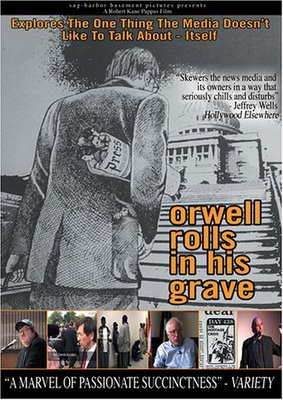
* Orwell Rolls in His Grave *
Orwell Rolls in His Grave provides a vital forum for ideas that will never be heard in mainstream media. New York University media professor Mark Crispin Miller says, "These commercial entities now vie with the government for control over our lives. They are not a healthy counterweight to government. Goebbels said that what you want in a media system – he meant the Nazi media system - is to present the ostensible diversity that conceals an actual uniformity."
This is a fantastic look at the media's least favorite subject - itself. Former CBS, ABC, Fox, New York Times and other journalists/producers come clean about how controlled the media really is, and despite great reviews and impeccable timing, it was predictably buried by... the media.
Oh yes, you think you know "the media lies"?
Sure you do, that's why you still watch the news and act like an expert at parties...
MUST WATCH ONLINE - http://www.freespeech.org/fscm2/contentviewer.php?content_id=1166
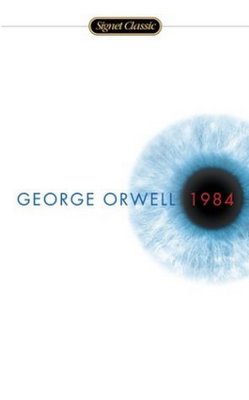
"Qui bono?"
"Who profits?"
Peace by peace...
BK
____________________
...
Black Krishna Brand
Philosophy - blackkrishna.blogspot.com/
Music - www.soundclick.com/bands/0/blackkrishna.htm
...
BONUS: Oh great, how come we won't know what the "Posse Comitatus Act" was until we are actually living in a police state?
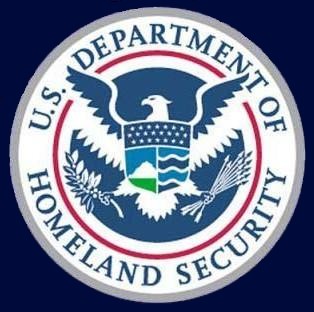
CounterPunch
October 17, 2002
Predators, Snipers and the Posse Comitatus Act
by KURT NIMMO
If you live in Falls Church, Virginia, and you see a funny looking aircraft circling over your neighborhood don't be alarmed. It's just the Pentagon looking for the sniper. CNN says Rummy wants to help out, so he has approved "military reconnaissance" of undetermined origin to snoop around the Washington area. CNN says the Pentagon has not disclosed what kind of equipment will be used. Yet earlier in the day I saw a report indicating the military will use General Atomics Aeronautical Systems Predator UAV drones.
They even showed video footage of the damn things.
Rummy just shot another big hole in the Posse Comitatus Act.
It's looked like Swiss cheese for years, ever since the military was "enlisted" to combat evil drug dealers. You know, drug dealers who sell CIA certified heroin and cocaine on the streets of American cities. According to CNN, the Pentagon is not really trashing the Posse Comitatus Act because there is no "direct involvement" between the cops and the military.
Maybe the copywriters over at CNN need to read up on the Posse Comitatus Act.
"Whoever, except in cases and under circumstances expressly authorized by the Constitution or Act of Congress, willfully uses any part of the Army or the Air Force as a posse comitatus or otherwise to execute the laws shall be fined under this title or imprisoned not more than two years, or both."
Of course, Rummy does not need Congress to tell him what to do. His "guidelines," recently published in the New York Times, demonstrate what he thinks about Congress and the American people.
[continued...]
SOURCE - http://www.counterpunch.org/nimmo1017.html

Yahoo! News
Katrina report urges clearer Pentagon role
By Tabassum Zakaria Thu Feb 23, 11:37 AM ET
WASHINGTON (Reuters) - The Pentagon should have a clearer role in dealing with disasters such as Hurricane Katrina, the White House said on Thursday in recommending emergency-management changes after a problem-plagued federal response.
President George W. Bush, who has been widely criticized for an administration response deemed too slow, had ordered the review on September 6 as New Orleans and other areas of the Gulf Coast struggled to recover from the disaster which killed about 1,300 people and left thousands homeless.
The review led by Frances Townsend, homeland security adviser to Bush, follows a congressional report that sharply criticized the U.S. government's disaster response.
"I wasn't satisfied with the federal response," Bush said during a Cabinet meeting. "The report helps us anticipate how to better respond to future disasters."
The 217-page report acknowledged inadequate preparedness for the storm and said the current homeland security system "has structural flaws for addressing catastrophic events." But it did not single out anyone for blame.
It said better planning and coordination and clearer designation of responsibilities were needed, and identified 11 changes needed before June 1, the start of the next hurricane season. These include establishing joint field offices to manage federal efforts when disasters are predicted.
The report said the departments of Homeland Security and Defense should jointly plan for the military's disaster support, and in "extraordinary circumstances" the Defense Department should lead the federal effort.
The federal government should not be the first responder to a disaster, but should help state and local authorities when they become overwhelmed, it said.
"Federal officials struggled to perform responsibilities generally conducted by state and local authorities, such as the rescue of citizens stranded by the rising floodwaters, provision of law enforcement, and evacuation of the remaining population of New Orleans," the report said.
It cited a lack of planning and of a functioning state and local command structure.
On the military's role, it said, "The federal response to Hurricane Katrina demonstrates that the Department of Defense (DOD) has the capability to play a critical role in the nation's response to catastrophic events."
"Since DOD, first and foremost, has its critical overseas mission, the solution to improving the federal response to future catastrophes cannot simply be 'let the Department of Defense do it'," it said. But the department's abilities to help must be better identified and built into response plans.
The military response to Katrina was slowed by federal law and Defense Department policy that any military assistance must first be requested by local officials, the report said.
It recommends linking the National Guard more closely with active-duty forces for homeland security.
A Defense Department representative should also be present at the disaster field offices and Federal Emergency Management Agency regional offices to improve military coordination, it said.
A report by congressional Republicans last week said federal emergency agencies were unprepared for Katrina and quicker White House involvement might have helped.
Homeland Security Secretary Michael Chertoff has acknowledged that his department was overwhelmed by the August 29 storm but has denied that he and Bush were unresponsive.
(Additional reporting by Caren Bohan)
* Email Story
* IM Story
* Discuss
* Printable View
RECOMMEND THIS STORY
SOURCE - http://news.yahoo.com/s/nm/20060223/pl_nm/bush_katrina_dc_3;_ylt=AroTJZqTKtfzPPuJCiYyQKobLisB;_ylu=X3oDMTBiMW04NW9mBHNlYwMlJVRPUCUl
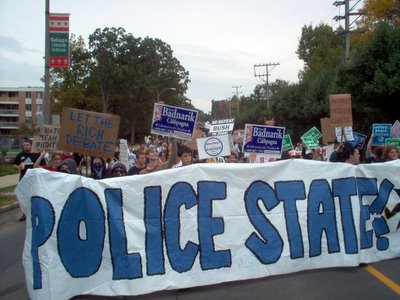


2 Comments:
I have been looking for sites like this for a long time. Thank you! »
What a great site Vicodin symptom Iris flower paintings Opulent east west tote picture Mitsubishi nec Retirement planning gulf county
Post a Comment
<< Home